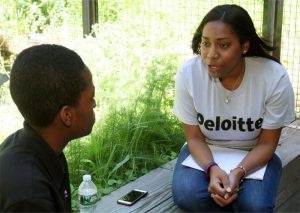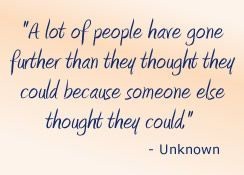It does not matter what line of work you are in, what stage you are in your career, how many failures you have seen or how successful you are, we all need someone to guide us ahead in our journey, someone who understands our potential and has guts to kick up the bum if necessary. I am referring to a mentor. A mentor is someone who sees you as you are. A mentor is someone in whose presence you can be yourself without any pretence or mask. The mentoring concept is as old as human race. Almost everyone at some stage or other in life looks up to a teacher for guidance. It’s a wrong notion that you can have one mentor throughout life, at each stages we need different mentors to guide us. We can see many instances in our m ythology where a mentor helps his mentee realize and attain his full potential. Chanakya was instrumental behind rise of Chandragupta Maurya as an emperor and was chief adviser to Chandragupta Maurya and his son Bindusara. It’s mentioned in some records that Chanakya was ten years older to Chandragupta.
ythology where a mentor helps his mentee realize and attain his full potential. Chanakya was instrumental behind rise of Chandragupta Maurya as an emperor and was chief adviser to Chandragupta Maurya and his son Bindusara. It’s mentioned in some records that Chanakya was ten years older to Chandragupta.
It seems, former Apple Inc. CEO the late Steve Jobs was a mentor to Facebook CEO Mark Zuckerberg. The two developed a relationship in the early days of Facebook and often met to discuss the best business strategies and management practices for the company. When Jobs passed away in 2011, Zuckerberg posted on his Facebook page, “Steve, thank you for being a mentor and a friend. Thanks for showing that what you build can change the world. I will miss you.”
PepsiCo CEO Indra Nooyi looks for mentors in all aspects of her life. She says “If I hadn’t had mentors, I wouldn’t be here today. I’m a product of great mentoring, great coaching… Coaches or mentors are very important.” She credits the mentoring she received from people around her for helping her break glass ceilings in business world.
Every student has a teacher / guru like Arjun had Dronacharya, but Dronacharya also tutored other students, he was a teacher even to the Kauravas as he was to the Pandavas. But, the facts remains that Arjun received the best training from his teacher. In Mahabharat, we have read that Sri Krishna became Arjun’s mentor on the war ground; he guided, advised Arjun at every step facilitating him to go in the right direction and win the war. This mentoring relationship teaches us a few things: Krishna as a mentor not only advised Arjun but also provided him guidance in each and every step. Whenever Arujn was doubtful whether he was doing the right thing or not, Krishna clarified his doubts. Krishna’s advice to Arjun is called Bhagvad Geeta.
The corporate world requires mentoring for helping employees to progress further in their chosen careers. It is a partnership between two people, the mentor and the mentee. Usually, the two people work in a similar field or share similar experiences. It is a useful relationship based upon mutual trust, respect and understanding each other.
Deloitte: The giant accounting firm has constantly practiced mentoring. Good and honest mentoring ensures that the leadership pipeline is never vacant. The name of the program, the Emerging Leaders Development Program, does exactly what it is intended to do: develop future Deloitte leaders. Much of the strength of their program lies in its focus and commitme nt. According to the Deloitte Website, each program participant is assigned a partner, principal, or director sponsor who commits to at least two years to help their protégées drive their own careers by helping them understand how to steer their organisation. This is one of the reasons Deloitte increases retention of employees and is committed to its employees to help achieve their goals and objectives in professional lives. Great organizations help people to reach zenith in their profession.
nt. According to the Deloitte Website, each program participant is assigned a partner, principal, or director sponsor who commits to at least two years to help their protégées drive their own careers by helping them understand how to steer their organisation. This is one of the reasons Deloitte increases retention of employees and is committed to its employees to help achieve their goals and objectives in professional lives. Great organizations help people to reach zenith in their profession.
Intel: Intel takes a slightly different approach to many other Fortune 500 companies. Rather than focus on hierarchy (connecting junior employees with senior employees), Intel focuses on specific knowledge transfer and domain skills that are in demand in present times. This philosophy is practiced by the fact that everyone has something to learn – and everyone has something to teach. Intel’s mentoring program is less formal and more entrenched in the culture, resulting in more organic connections. The strength of Intel’s mentoring program lies in its momentum; rather than a coordinator managing and overseeing the program like a hawk; employees take much of the process into their hands and take charge of their own learning. This results in more commitment with the program, as well as a deeper sense of autonomy and mastery for the employees. This process has helped Intel in creating innovative practices.
These days, mentoring isn’t just a one-way flow of knowledge from old to young, from experienced to inexperienced. In a globalised world, connecting with people of different ages, genders, qualifications and experience with diverse points of view has become essential. The multigenerational workplaces are the norm. In fact, progressive and large companies have started to run ‘reverse mentoring’ programs which helps matching senior executives with millennial to exchange fresh perspectives and encounter new ways of thinking about work.
Reverse mentoring refers to an initiative in which older executives are paired with and mentored by younger employees on topics such as technology, social media and current trends. In many organizations it is observed that senior executives are out of touch with the times and could really benefit from Reverse Mentoring.
Usually, people who are senior positions or retirement position sitting at top positions in organizations make good mentors because they know the culture of the organization and requirements. Sometimes reverse mentoring also is useful to bridge the generation gaps between senior and juniors. At times those gaps get reduced when each one appreciates the other for his/her technical, people, or hard skills.
One of the assumptions many people make is that mentoring should be within the organization, it’s a wrong notion that mentoring must be restricted within four walls of an organization. So long as a mentee (an employee) can benefit from the outsider perspective, outside mentoring is not a bad idea. It’s been observed that people can learn more and add more insights when people interact at very different contexts. The people skills that these relationships are based on surpass work cultures.
Another blunder people make is that they assume that female mentees would want to connect to female mentors in order to learn how best to navigate in male-dominated fields, but the fact is that women benefit from male mentors, especially in learning just how clueless men are of problems faced by females, and how females get lost in male-dominated fields. It’s sad that talented women usually don’t get the kind of individual career guidance and support. Men really have to step into shoes of a lady to understand her and train her else, soon organizations will face talent shortage.
And, finally, the old adage that a teacher learns more than the student is very true in mentoring. The mentor and mentee both learn a lot from each other. Their regular interaction can be useful, it creates an affinity between them and both learn from successes and failures of one another. And throughout the process, both grow their networks and develop professionally.














































